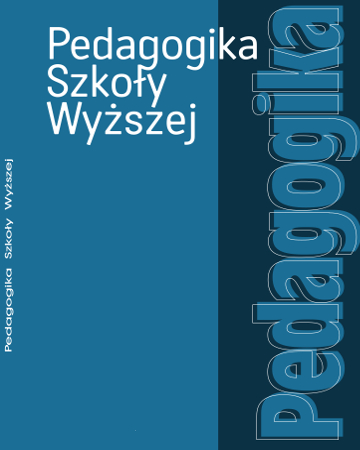ISSN: 2083-4381
OAI
DOI: 10.18276/psw



From Editors
Since 1995 at the University of Szczecin a periodical magazine titled Pedagogika Szkoły Wyższej (Pedagogy of Higher Education) has been published. Until now 32 volumes were printed. They enclose texts which provide information on research and practical actions undertaken in the frames of Polish National Seminar of Pedagogy of Higher Education. The Seminar has always consisted of annual conventions gathering academics from all types of schools who are interested in the pedagogical aspects of higher education. The founder of the seminar and its longtime president was Kazimierz Jaskot. It was started in 1993 at the Faculty of Pedagogy of University of Szczecin at the dawn of political, social and economic changes which were taking place in Poland. The annual conventions were participated by people sharing common care for the quality of education, both at the level of reflexion and practice. The sign of this care were shown in the attempts to describe, analyze, explain, evaluate, modify and projecting the academic praxis. Those attempts, signalized in the mentioned publications, were carried out, which has to be stated, with various results. It is hard to research the reality which we are subjected to. It is easy to get into a trap of superficial analysis; virtual engagement and change, being blind for our own practice and being self-pleased and to forget that pedagogy, including the pedagogy of higher education can and should be a form of social and cultural criticism. (…) Only pedagogy is both knowledge (or using knowledge), the wisdom of understanding life and brightening its perspectives, sensitivity for the developmental needs of people during their development towards worthiness and full powers and at the same time it is building competences of development. (Zbigniew Kwieciński)
Referring to the tradition and experience of the seminar, aware of the traps, we offer readers and authors a national-range biennial. Our intention is to create a national forum for the debate of the problems of universities as educational institutions, with an aim to also invite in the near future researchers from other countries in the near future.
Given the pace and scale of the changes that are taking place today in the academy and its surroundings, this debate seems to be particularly urgent. Changes should not be associated exclusively with the new regulations and the need to implement the National Qualifications Framework. On the one hand, these new legal and organizational solutions are not as revolutionary as it is tried to show them. On the other hand, cultural, social and economic changes that provide the context, background and content to the life of an academy seem to be much more radical, and have its influence on the higher education for a long time. Academy is getting more and more away from the well-established traditions and values, determining the features of university. The fields of these values are recognized by Jerzy Brzezinski accurately describing them in eight bipolar dimensions (autonomy vs. dependence, the unity of research and teaching vs. research and teaching individuality, exclusivity vs. pluralism, tolerance vs. xenophobia, individualism vs. collectivism, truth vs. pragmatism, universality vs. exception, and change vs. stagnation).
Today, the picture of academic values is becoming increasingly complicated and entangled. The logic of the market and consumerism ruthlessly enters into all areas of life, including in the area of academic education. Educational aspirations are dramatically increased, but they are often far away from the skills of the ones subjected. In the classroom, on the sides of the teachers and the students, there are patterns of behavior, ideas about reality and expectations shaped by culture not marked by reading the canon, but by cheap, colorful writing, reality shows and television series. This has changed the status of knowledge in the direction of legitimizing what is useful and reachable ad hoc. The truth has been deconstructed and knowledge being involved in alliances with the authorities loses its connection with cultural and intellectually soil from which it rose. (Frank Furdi). That is why the academic values need to be (even constantly) redefined.
Therefore the debate over how to not lose the tradition, not to lose that what can touch an individual is particularly important. How can we also not drown in tradition, which, without being subjected to reinterpretation and renewal will be empty of meaning, incapable of any impact on reality? How take advantage of the cultural potential of academic staff and students at the same time blocking the degradation phenomena of cultural importance and future impact of university elitism (Lech Witkowski). Useful for that might be appealing to tradition, both as a resource pool from which you can use to take action in the present and constructing the future, as well as a set of symbols that builds individual and group identity. Tradition, however, like many other phenomena, is marked by ambivalence. It may be dysfunctional, lead to the perpetuation of the status quo, to stagnation and inertia that we want to avoid. We encourage you to make a critical intellectual movement, which will go beyond what Hans-Georg Gadamer called pragmatic wisdom, expressed by habit and adjusting to all the institutionalized forms of existence, the existence of an academic. The effects of this movement will be covered in the columns of the magazine. We hope that in this way, authors and editors will have their part in not limiting the life of the academy to the recruitment, points, grants and projects, but in what was called the life of ideas (Wilhelm Humboldt), so we would not go on epistemological retirement and would not close the book of learning (Maria Czerepaniak-Walczak).
The journal consists of the following chapters:
Studies and dissertations
Polemics, debates, opinions
Reports from research
Information
Reviews
WE INVITE YOU TO COOPERATE WITH US
«Pedagogy of Higher Education» is published as an open access scientific journal. Articles are published under the licence of CC BY-SA (Creative Commons – ShareAlike). Publishing articles in the journal is completely free of costs.
